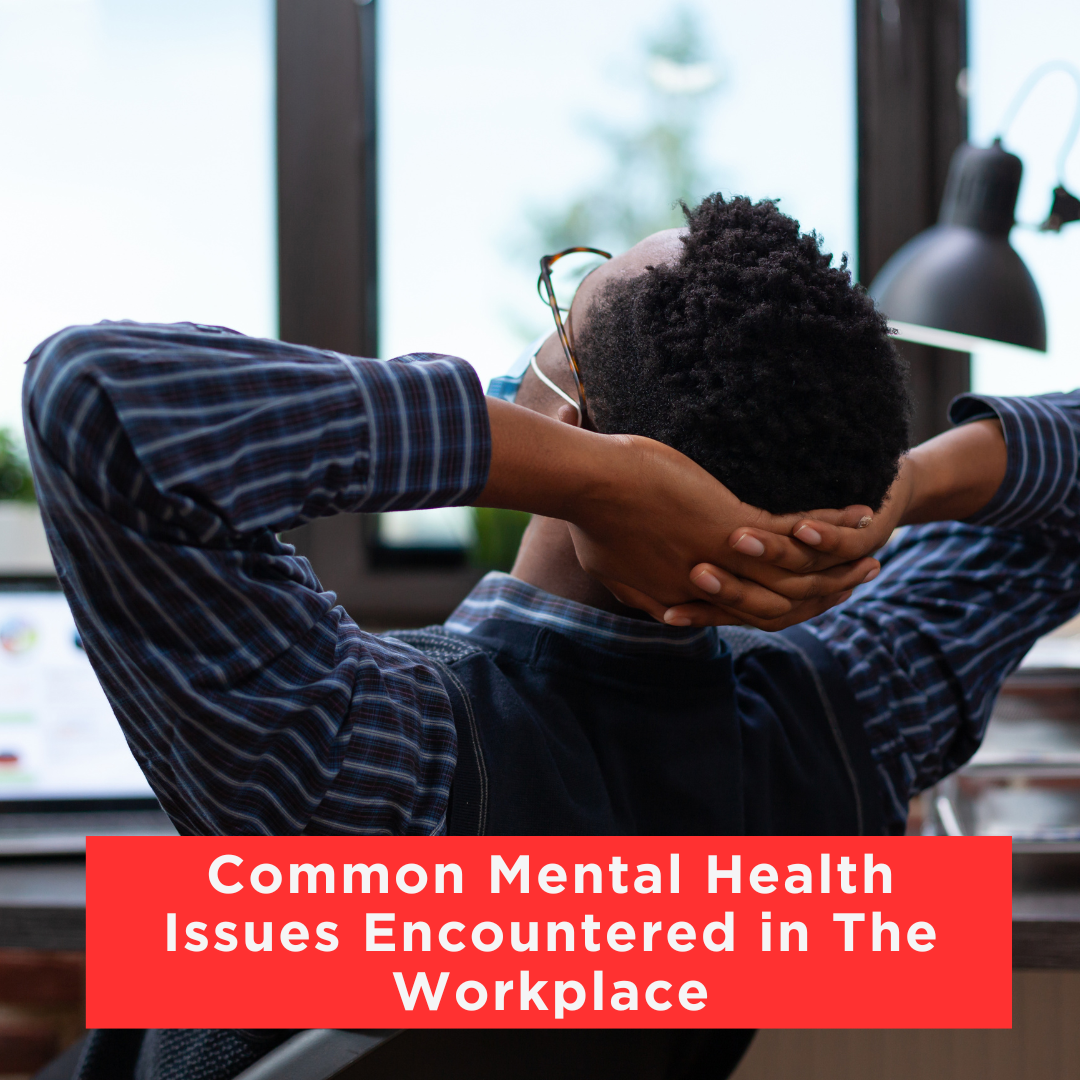Have you observed an increase in the incidence of mental health problems in modern-day workplaces characterized by high demands? It appears like many employees are facing mental health challenges that are affecting both their well-being and productivity. Recognizing and understanding the diverse mental health problems that can surface in the workplace is essential in establishing a supportive and inclusive work culture.
Related Post: Recognizing the signs of stress on your mental health
In this article, we will explore some common mental health problems encountered in the workplace and provide insights on how employers and employees can address and manage these issues effectively.
Depression
Depression is a prevalent mental health condition that affects a significant number of individuals across the globe. The condition is characterized by a persistent feeling of sadness, hopelessness, and a loss of interest or pleasure in activities once enjoyed. The impact of depression reaches far and wide, extending beyond an individual’s emotional state. It can affect various aspects of their life, including work, relationships, and overall quality of life. Those experiencing depression often struggle with daily tasks, have difficulty concentrating, and may face challenges in maintaining healthy relationships. The condition can also lead to physical symptoms such as changes in appetite, sleep disturbances, and a general lack of energy.
Stress and Burnout
Excessive stress and burnout are also among the common mental health issues in the workplace. Heavy workloads, long hours, tight deadlines, and constant pressure can all harm employees’ mental health. Prolonged stress can cause weariness, decreased productivity, and even physical health concerns.
Related post: Burnout syndrome what you need to know
Anxiety Disorders
Anxiety disorders encompass a range of mental health conditions, including Generalized Anxiety Disorder, Panic Disorder, and Social Anxiety Disorder, among others. The disorders can significantly affect the capability of employees to perform their job efficiently. While Generalized anxiety disorder (GAD) is characterized by persistent and excessive worry about various aspects of life, such as work-related tasks, personal relationships, and everyday responsibilities, Panic Disorder involves recurring and unpredictable panic attacks, which are intense episodes of fear and physical discomfort. The fear of experiencing a panic attack can cause individuals to avoid certain situations or environments, including the workplace.
Social anxiety disorder, also known as social phobia, however is characterized by an intense fear of being judged or embarrassed in social situations. This fear can make it challenging for individuals to participate in meetings, engage in group discussions, or interact with coworkers. Employees in the workplace with a social anxiety disorder may excessively worry about being scrutinized or negatively evaluated, leading to increased stress and impaired job performance. The impact of anxiety disorders on the workplace extends beyond individual employees. It can contribute to a strained work environment, affect team dynamics, and hinder overall productivity.
Related post: Mental Health Why Companies Should Worry About Their Employees Health
Schizophrenia
Schizophrenia is a severe mental health disorder that can cause an employee to experience hallucinations, delusions, and disordered thinking. Schizophrenia can lead to poor concentration and difficulties in social interaction, which can negatively affect an individual’s performance in the workplace.
Post-Traumatic Stress Disorder (PTSD)
PTSD can occur after a traumatic event, such as a workplace accident or incident. It can cause an employee to experience flashbacks, nightmares, and anxiety, which can affect job performance and relationships with coworkers.
Bipolar Disorder
This is a complex mental health condition characterized by significant mood swings that can profoundly impact an employee’s job performance and relationships with coworkers. Individuals with bipolar disorder experience alternating episodes of mania and depression, each with distinct symptoms and challenges. During manic episodes, individuals may feel excessively energetic, and impulsive, and have an inflated sense of self-confidence. Despite their productivity and abundance of ideas, their ability to focus and make sound decisions can be compromised. This can lead to impulsive actions, poor judgment, and difficulty adhering to deadlines or maintaining consistent work quality. The intensity of manic episodes can also cause disruptions in interpersonal relationships, as the individual may come across as overly talkative, irritable, or confrontational.
Contributing Factors To Mental Health Problems In The Workplace
Several factors can contribute to mental health problems in the workplace. Here are some common ones to consider:
High Workload and Pressure: Excessive workloads, tight deadlines, and constant pressure to meet targets or expectations can significantly impact employees’ mental well-being. Feeling overwhelmed and constantly under stress can lead to burnout and other mental health issues.
Lack of Work-Life Balance: When employees are unable to maintain a healthy work-life balance, it can take a toll on their mental health. Long working hours, overtime, and limited time for personal interests and self-care can lead to increased stress and decreased overall well-being.
Poor Managerial Support: A lack of supportive and understanding management can contribute to mental health problems. Ineffective communication, micromanagement, lack of feedback, and a failure to address employee concerns can create a negative work environment, leading to stress and anxiety.
Workplace Culture and Relationships: An unhealthy workplace culture, characterized by excessive competition, lack of collaboration, or bullying and harassment, can greatly impact mental health. Negative relationships with colleagues or supervisors can lead to increased stress, anxiety, and even depression.
Job Insecurity: Uncertainty about job stability, such as fear of layoffs or job loss, can cause significant stress and anxiety among employees. This can have a detrimental effect on their mental well-being and overall job performance.
Workplace Harassment and Bullying: Harassment in the workplace can cause significant stress and anxiety for employees, leading to mental health problems such as depression and post-traumatic stress disorder.
Measures to Improve Mental Health in the Workplace
To create a mentally healthy workplace that fosters professional and personal growth, organizations must prioritize mental health initiatives, reduce stigma, and promote a healthy work-life balance. Understanding and accommodating the unique needs of each mental health challenge will help foster a supportive work environment. Employers, HR Personnel, and HSE Officers can take steps to reduce workplace stress and support employees’ mental health, such as providing resources and training, promoting work-life balance, and creating a positive work environment.
Related post: Mental Health At Work 7 Ways To Support Employee Wellness
At Medbury Healthcare, we understand the importance of prioritizing mental health and well-being in the workplace. That’s why we offer comprehensive Employee Assistance Programs (EAPs) designed to support organizations in promoting a positive work environment and ensuring the overall productivity and satisfaction of your workforce.
Related post: Nine-9 Habits of mentally strong people in the-workplace
Our EAPs provide a range of resources and support services tailored to address mental health challenges faced by employees. We are convinced that a healthy and contented workforce is an essential factor in the success of any organization. Thus, our programs are designed to foster a work culture that is both supportive and inclusive. Through our EAPs, employees have access to confidential counseling services, both in-person and virtually, where they can discuss any personal or work-related issues they may be facing. Our team of experienced professionals, including licensed therapists and counselors, is available to provide guidance and support to employees, helping them navigate through difficult situations and develop effective coping strategies.
Contact us today to learn more about how our Employee Assistance Programs can help your organization promote mental health, enhance employee well-being, and drive productivity and satisfaction in the workplace. Together, we can build a healthier, happier, and more successful workforce.








No Comments